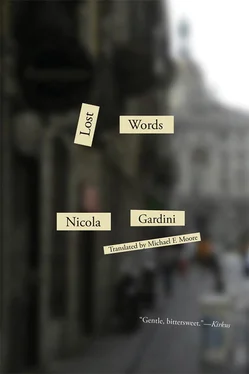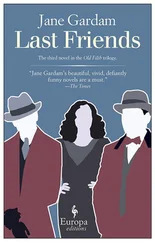*.
My mother was beyond the forgiveness of God. While I was in Rita’s bedroom watching the portable Telefunken, the priest was telling her everything. When was I going to get it through my thick skull that I, the custodian’s son, had to behave better than everyone else? I had to set an example! Instead of acting the same as all the others!
She was still carrying on when father got home. He heard the reason why, and burst out laughing: “When we were kids do you know how many times we fell into the water? One kid even drowned…”
“There’s nothing to laugh about,” she shouted. “I want you to get on the intercom and say a couple things to the fathers of those two juvenile delinquents. Our son shouldn’t have to pay for their actions! I take it back — it’s not right that I should have to pay!”
My father continued to downplay what had happened. To him it was just kid’s stuff. She should forget about it. What did the parents have to do with it anyway?
“It’s not kid’s stuff, for crying out loud!” my mother retorted. “They’ll say: ‘Well, who is the doorwoman to talk? She doesn’t even know how to raise her own son.’ I can already hear them. I have a reputation to defend. And you, if you’re a real husband, you should stand up for me!”
“You’re crazy! You can stand up for yourself! Isn’t that what the feminists always say? That you don’t need us men? That we’re useless?”
“Don’t even start with politics — I’m talking about me !”
“Who do you think I’m talking about?”
“There you go again, changing the subject. I tell you I want to move away from this place and you always complain about real estate agents…”
“Alright already…” my father gave in before she could start up again about wanting a house.
He went to the intercom and called down the fathers of the two boys.
They came immediately and loudly explained that Signora Zarchi had already met with Pietro and Matteo and that the boys had apologized. The Zarchi business was over. Irritated by their tone, my father demanded that they go straight back to Zarchi and lay the full blame on their sons. Rovigo turned pale. Paolini shoved my father and told him to worry about his own son. In a minute all three were in the lobby fighting like dogs. The stairwell was quickly crowded with curious heads peering over the railings. Rovigo called my father an idiot. Paolini aped his frenzied gestures, and looked around for spectators. My father argued that it had nothing to do with me and shouted that Pietro and Matteo were juvenile delinquents who were only going to get worse. Today they torture a playmate, tomorrow they rob a store and kill innocent bystanders… My mother stared at him with an air of approval and a clear desire to be avenged once and for all… Paolini and Rovigo traded contemptuous looks and left my father in the lurch with a loud “Fuck You!” My father made as if to chase after them but mother stood in front of him, crying “For the love of Pete.” My father tried to break away, shouting “Fascist pigs!” while she put her hand over his mouth and pushed him into the house, drenched in sweat.
“What did I tell you?” my father gasped. “They were even swearing at me. They made a fool of me! We should have dropped the whole matter… Fuck!.. But you? No!”
“Calm down!” she repeated. “Calm down!”
But he didn’t want to hear it. He locked himself in the bedroom and started punching the walls.
“This year, come Christmas, there’s going to be three fewer people who leave tips, you wait and see,” my mother sighed, ladling the soup into bowls.
*.
My father noticed the sign before coming through the front door.
NO COFFEE DRINKING IN THE LOGE
“Bastards,” said my mother as she removed it from his hands.
She tore it into little pieces and explained that Mantegazza had come downstairs to the loge a couple of times. Yes, she had offered her a cup of coffee. What was the harm in that?
She was lying. Now the old crone was coming downstairs every blessed day. She would stay for hours until the sun went down. Soon we no longer needed to ring her on the intercom. She came on her own, as certain as death and taxes, and she also brought along her dog, Bella, who would curl up under the table, drooling.
“She’s a fascist!” my father was indignant. “Once I heard her in the service room singing Faccetta nera !”
Mother’s patience ran out. “So what! There you go again, putting politics into everything!.. This is my house and I can invite whoever I want to come in!”
My father gave her a look as if to say, “Talking with you is a waste of time.”
Saturday, on her way back from vespers, Signorina Terzoli stopped by the loge. After an unusually cordial hello, she started talking about how the recent rains had damaged the roof of the church. Padre Aldo needed money to repair it and she and some other women from the neighborhood had taken it upon themselves to raise the necessary funds from the parishioners.
“God bless you,” said my mother. “When you’ve got money, it’s great to use it to help other people.”
Terzoli, ever the good Christian, wondered, “And who doesn’t have a few liras to spare, Elvira? As long as its donated with a pure heart. Being rich isn’t a matter of quantity. It’s the gesture that counts. Isn’t a child’s sacrifice of a piece of candy worth more than a rich man’s gift of a jewel to his mistress?”
“I can barely make it to the end of the month,” my mother quickly protested.
Terzoli gave her a condescending look. “It’s simply a question of good will, Elvira. We human beings are capable of putting up with the most grievous situations. All you have to do is want it. I’m thinking of you, Elvira… I’m thinking of how much your generosity must cost you!”
My mother defended herself. “I wouldn’t put it that way. This is my job and I’m trying to do the best I can…”
“Elvira, generosity is a good thing, but you shouldn’t let other people take advantage of you… Not even God himself would want that!”
“You’re right! Let’s hope that one day God rewards me for everything I’m doing…” She inspected the scars on her wrists.
Signorina Terzoli changed color. Her honeyed voice turned sharp. “Let me get straight to the point: the residents do not approve of the fact that every day you receive Signora Mantegazza in the loge. If everyone were to stop by Elvira’s for a cup of coffee, what would the loge turn into? It’s also a question of security…”
Mother suddenly realized the treachery of Terzoli and the women who had sent her. “Signora Armanda is a lonely old woman,” she stated with a saccharine smile. “Can’t we just humor her? It doesn’t cost me anything, and I feel as if I were helping my own poor mother, who passed away so many years ago…”
The wrinkle lines on Terzoli’s forehead smoothed out.
“Good for you, Elvira! Please don’t get me wrong. I was just passing on what I heard, but I know, it’s empty gossip. Some people think we should live with security guards at the gate! For heaven’s sake, things aren’t that bad, are they? We have to trust our neighbors. Padre Aldo himself said it in his sermon this evening.”
*.
When Signora Bortolon the seamstress invited me up for a snack, we knew she was up to no good.
“She’s the worst of the lot,” my mother warned.
I had certainly not forgotten what Bortolon had done a few years earlier to the Rossanos, the family from Messina who lived next door. I can still see their lovely little girl, who was born with long locks of hair. “Our Lady’s braids” is what the Sicilians used to call that blessing from God. They would all worship her. I can still hear the shrieks of her mother when her daughter came home one day after Signora Bortolon had invited her over for a treat. Her locks were gone! Not long after the mother died from that act of sacrilegious violence. The widower was forced to return to Messina with his orphaned little girl to live with an old aunt.
Читать дальше












